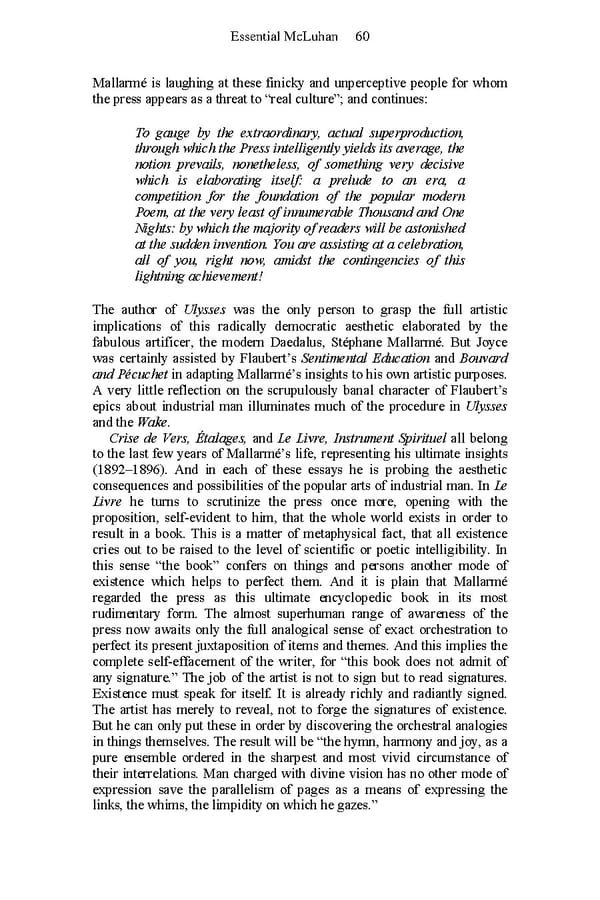Essential McLuhan 60 Mallarmé is laughing at these finicky and unperceptive people for whom the press appears as a threat to “real culture”; and continues: To gauge by the extraordinary, actual superproduction, through which the Press intelligently yields its average, the notion prevails, nonetheless, of something very decisive which is elaborating itself: a prelude to an era, a competition for the foundation of the popular modern Poem, at the very least of innumerable Thousand and One Nights: by which the majority of readers will be astonished at the sudden invention. You are assisting at a celebration, all of you, right now, amidst the contingencies of this lightning achievement! The author of Ulysses was the only person to grasp the full artistic implications of this radically democratic aesthetic elaborated by the fabulous artificer, the modern Daedalus, Stéphane Mallarmé. But Joyce was certainly assisted by Flaubert’s Sentimental Education and Bouvard and Pécuchet in adapting Mallarmé’s insights to his own artistic purposes. A very little reflection on the scrupulously banal character of Flaubert’s epics about industrial man illuminates much of the procedure in Ulysses and the Wake. Crise de Vers, Étalages, and Le Livre, Instrument Spirituel all belong to the last few years of Mallarmé’s life, representing his ultimate insights (1892–1896). And in each of these essays he is probing the aesthetic consequences and possibilities of the popular arts of industrial man. In Le Livre he turns to scrutinize the press once more, opening with the proposition, self-evident to him, that the whole world exists in order to result in a book. This is a matter of metaphysical fact, that all existence cries out to be raised to the level of scientific or poetic intelligibility. In this sense “the book” confers on things and persons another mode of existence which helps to perfect them. And it is plain that Mallarmé regarded the press as this ultimate encyclopedic book in its most rudimentary form. The almost superhuman range of awareness of the press now awaits only the full analogical sense of exact orchestration to perfect its present juxtaposition of items and themes. And this implies the complete self-effacement of the writer, for “this book does not admit of any signature.” The job of the artist is not to sign but to read signatures. Existence must speak for itself. It is already richly and radiantly signed. The artist has merely to reveal, not to forge the signatures of existence. But he can only put these in order by discovering the orchestral analogies in things themselves. The result will be “the hymn, harmony and joy, as a pure ensemble ordered in the sharpest and most vivid circumstance of their interrelations. Man charged with divine vision has no other mode of expression save the parallelism of pages as a means of expressing the links, the whims, the limpidity on which he gazes.”
 Essential McLuhan Page 66 Page 68
Essential McLuhan Page 66 Page 68